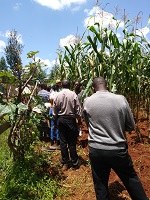Study Project Kenya 2019
August to September 2019, Kenya
The interdisciplinary study project 2019 addressed the important topic of „Food and nutrition security in Kenya“. A group of 21 students participated in this unique experience and opportunity. The 11 students from Humboldt-Universität zu Berlin, the 6 students University of Nairobi and the 4 students Karatina University deepened their research skills and thematic knowledge, furthered their international and interdisciplinary competences, widened their network and built friendships.

The participants of the study project in Karatina (photo: EAGER Trans-Net)
The students had a wide range of knowledge (Environmental Studies, Horticulture, Geography, Agricultural Economics, Literature, African Studies, Natural Resource Management, Rural Development) and background (9 Kenya, 6 Germany, 2 US, 1 Georgia, 1 Liberia, 1 Italy, 1 UK). Together, they developed a joint research project and carried out empirical research on food and nutrition security in a children’s home in Kakamega County, Western Kenya, from 23 August to 8 September 2019. One student also documented the process of the study project on video camera.
The primary goal of the joint interdisciplinary research project was to understand the food and nutrition security in the children’s home including the food supply system. Based on the outcomes of this, the second goal of the junior researchers was to either give recommendations for improving the food and nutrition security in the children’s home or to showcase it as best practice example for sharing it with other children’s homes.
Data collection in the children's home in Kakamega (photos: EAGER Trans-Net)
The 17 day fieldwork started off with a workshop in Karatina where all the students got together, and finalized their research design. Also, an official opening at Karatina University was held. The researchers then travelled to Kakamega were the group stayed at the children’s home to collect empirical data. In the second week, the group of students stayed for three days with farmers in Kitale who supply food to the children's home. Towards the end of the fieldphase, a festival took place at the children’s home where the children of the children’s home performed songs, dances, plays and poems around the theme of food and nutrition security.



Data collection on farms in Kitale (photos: EAGER Trans-Net)
For data collection, the students used both qualitative (interviews, focus group discussions, observations, story telling) and quantitative methods (soil testing, weighing of food portions, nutritiousness of food and children’s demand through literature review). First analyses of the collected data was done during the fieldphase. These preliminary results were then presented to the staff and children of the children’s home and the farmers in Kitale. The written report with the final findings will be published and made available to relevant stakeholders in early 2020.

Presentation of preliminary research results to stakeholders in Kitale (photo: EAGER Trans-Net)
The team of students were guided and supervised by a group of EAGER Trans-Net members: Dr John Busienei (UoN, Agricultural Economics), Dr Makau Kitata (UoN, Literature), Dr Martin Marani (UoN, Geography) Dr Geoffrey Wambugu (KarU, Environmental Studies), Dr Thomas Aenis (HU, Agricultural Extension and Communication) and Birgit Zipf (HU, Geography).
The study project was kindly supported by funds from bologna.lab of Humboldt-Universität zu Berlin and the Erasmus+ programme of the European Commission. The team of students and lecturers is also very thankful to every person at Malaika Children’s Home in Kakamega and the eight farmers and their families in Kitale. Their dedication and support had a significant share in the success of this project.
Contact: eager.trans-net@hu-berlin.de



